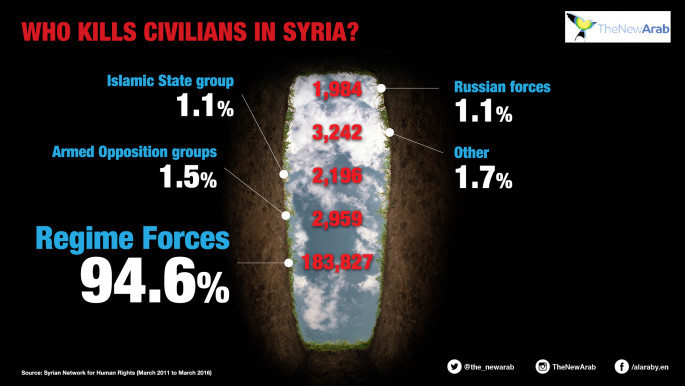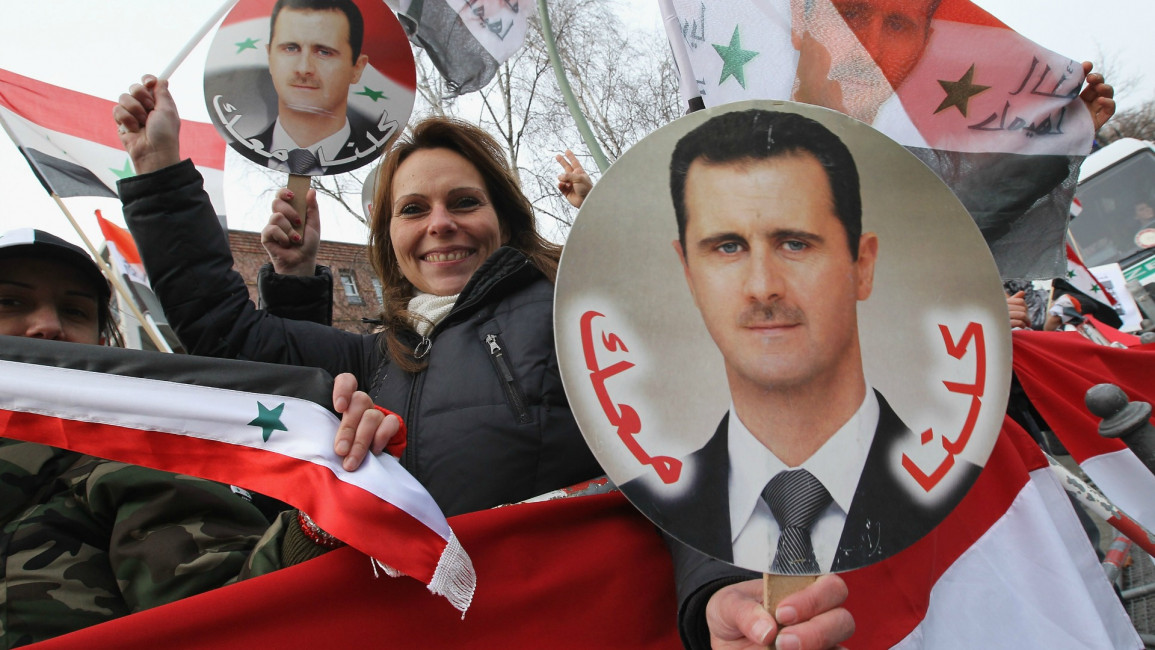
Assad's allies in the West
If there's one thing everyone can agree on about Syria, it's that nobody can agree on anything.
After five years of constantly evolving strife, the world still looks on in occasional waves of horror, pity, outrage and apathy - before returning to the stoic conclusion that the conflict is just too complicated to understand.
The laws of war, human rights and geopolitics have gone out the window. With them, regrettably, the rules of responsible journalism seem to have gone, too.
At one time, open-source activists and "Facebook revolutionaries" made the Arab Spring history's most documented tectonic societal shift. Today, Syria's war is a dangerously polarised nebula of partisans, as much in the media as on the battlegrounds.
Few non-aligned journalists remain to report unbiased and trustworthy news. Without credible information, it's hard to understand anything that happens in Syria, contributing to a political and public consensus of apathy. What's left is a news landscape driven less by actual events than by a narrow set of available perspectives.
"The Syrian conflict involves a public relations war with a level of sophistication we’ve never seen before," American writer Patrick Henningsen said in an report published by Russia Today. Ironically, it's an accurate assessment of a reality which Russia had a primary role in fostering.
In areas where Russian intervention hasn't decisively turned the tide militarily in favour of Syrian President Bashar al-Assad, the allies' powerful public relations machine has been working to pick up the slack.
The alliance with Putin has availed Assad of the full gauntlet of Moscow's superior state-controlled media apparatus. The result: a highly efficient and centralised narrative spread throughout the international press. For every report, a favourable counter-narrative filters down from the regime megaphone to a wide network of smaller websites and blogs.
An example: Last month, when reports of 27 people killed in an airstrike that destroyed Aleppo's Quds hospital pointed blame towards the Syrian Army, it sparked a rare outrage that briefly put the conflict back on the international agenda.
Regime media arm SANA denied there was never a hospital hit. Russia Today then commandeered video footage shot by Aleppo journalist Hadi Al-Abdallah from a separate incident and re-edited it to remove dialogue mentioning the bombs came from an airstrike, before broadcasting it on its Arabic channel with a headline blaming the hospital attack on rebel groups.
A host of blogs followed suit, aiming to discredit the initial reports, attacking the NGOs and rescue workers and the #AleppoIsBurning campaign as all being part of some sinister Western conspiracy.
 |
They are the type of reports that wouldn't get a second glance in mainstream news outlets, but that's just the point |  |
However, many of the stories weren't produced by propaganda agencies run by the Russian or Syrian government - they were written in English by young bloggers who have positioned themselves as Assad's allies in the West.
They are the type of reports that wouldn't get a second glance in mainstream news outlets, but that's just the point. Publishing coverage that is more activist than journalistic, they have formed a network of "independent" and "alternative" news websites aiming to challenge the mainstream media.
 |
|
| [Click to enlarge] |
One such outlet, The Anti-Media, has more than 1.6 million Facebook followers. Many such groups make their bread and butter from blogging and tweeting articles about environmentalism, mass surveillance and policebrutality, with a general affinity for protests and distaste for global capitalism - with the occasional exception.
Courting an engaged, young and progressive audience concerned about global inequality and social injustices, wary of mainstream media and weary of foreign wars - they offer simple answers to complex problems. Among them, examples abound, running the gamut from hagiography of Muammar Gaddafi and singing praises of President Assad, to comfortably wading in the realm of conspiracy theory.
When there was starvation in besieged Madaya, Eva Bartlett, a Canadian writer for Russia Today,trumpeted reports claiming that the images of severely malnourished children were either fake or propaganda.
The White Helmets? Those guys who regularly pull bodies out from the rubble of airstrikes? According to Vanessa Beeley, a writer for 21st Century Newswire, their their life-saving work is "propaganda designed to reinforce Washington's policy of 'regime change' in Syria".
MintPress Newsrepublished that article, and later followed up with another stating "[The White Helmets] are nothing more than a terrorist rescue organization, funded, directed and promoted by Western governments, intelligence agencies and foundations aimed at assisting Western-backed terrorists in the destruction of secular Syria".
Rick Sterling, writing in the long-running political newsletter CounterPunch, scoffs at the suggestion that a no-fly zone in Syria would save lives or stop the carnage of regime airstrikes - the same airstrikes which multi-year surveys show cause the majority of civilian deaths, according to the Syrian Network for Human Rights.
Echoing Sterling in the same publication, writer Paul Larudee ventures that NGOs such as Amnesty International and Physicians for Human Rights - in league with NATO's warmongers - exaggerate the Syrian Air Force's use of barrel bombs, which are notorious for their crude technology and imprecise targeting, resulting in disproportionate civilian casualties.
 |
Some writers in this milieu share ties more significant than their dissenting opinions |  |
The peremptory agendas of such independent outlets have in the past raised questions as to their credibility and funding sources.
In a lengthy response to allegations that MintPress is "on the payroll of the regime of President Assad of Syria", its chief editor Mnar Muhawesh denied the publication's editorial positions had been influenced by outside actors, while doubling down on those positions, such as the belief that Syria's 2011 uprising was "instigated by the CIA and planned out as early as 2006".
Some writers in this milieu share ties more significant than their dissenting opinions: Bartlett, Beeley, Larudee and Sterling are all steering committee members of an organisation named the "Syria Solidarity Movement" - an activist group and registered nonprofit which has collected more than $1,545,000 in gross receipts from donors since its founding in 2007.
SSM has organised demonstrations "in support of the Syrian government", and two group trips to Syria on official visas arranged by an Iranian NGO.
In June 2014, the group sponsored a delegation to travel to Syria to observe presidential elections dismissed as a "stage-managed sham" by many in the international community, with Bashar Al-Assad receiving 89 percent of votes.
On the morning of the election, the delegation published an endorsement, stating: "The poll is about to demonstrate the real scale of public support President Assad is enjoying inside the country, heroically resisting foreign-sponsored aggression for more than three years."
One delegation member, however, acknowledged in an email that the process was "not without flaws", including voters being intimidated, possibly paid off, and that the delegation was under constant watch by government chaperones.
During the visit, Larudee and Bartlett appeared in an interview on Syrian state television, met with government officials, and were even granted a sit-down meeting with Ali Haidar, head of the Ministry of National Reconciliation. Created in 2012, it is responsible for negotiating surrenders of rebel groups in efforts to win hearts and minds and facilitate reinsertion for who wish to return to the state.
SSM has continued to promote the ministry's efforts and has organised similar trips for Syrians to visit the United States.
Interviewed for this report, Paul Larduee, SSM's treasurer, acknowledged his group's opinions were unpopular, but offered a calculated rationale. "It's easy for us to come off as apologists for Assad when we’re working to correct the false information in the hostile Western media," Larudee said.
"What we see is a long-term intention to overthrow the government of Syria and replace it with a puppet. If you compare Assad's Syria with the US, you can see how rigged the system is not to allow any kind of real change - just look at Bernie Sanders' election campaign."
Indeed, US presidential candidate Bernie Sanders today represents a faultline among the American left.
"I worry too much that Secretary Clinton is too much into regime change," Sanders said of his opponent, signalling a sensitivity to the views of his base, which recent survey data show to be highly concerned about US military involvement in Syria.
In an interview, Syrian-British writer Robin Yassin-Kassab bluntly criticised what he termed the left's naïve allurement with anti-establishment rhetoric.
"They see it in silly binary terms - 'I'm against American imperialism; therefore I support President Putin's "anti-imperialism",' which is insane because that's also, or even moreso, a savage imperialist power, and at the moment a very worrying one," said Yassin-Kassab.
Almost nobody will say they go to CNN or Sky News to get a deep, nuanced understanding of anything - least of all the Syrian civil war. There are plenty of reasons to criticise mainstream media and US foreign policy.
But any media outlet that eschews established standards of responsible journalism, fact-checking and editorial neutrality to pursue a partisan agenda doesn't advance public understanding - it only polarises it. And in a war that has killed hundreds of thousands, expatriated millions, and confused everyone else, more polemic is the last thing we need.
Follow him on Twitter: @shawncarrie
Opinions expressed in this article remain those of the author and do not necessarily represent those of The New Arab, its editorial board or staff.




